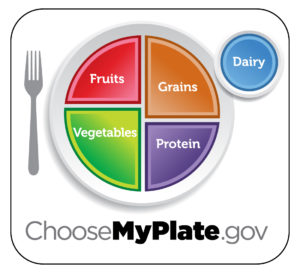It’s no secret that healthy eating habits are especially important for teens. Your body and brain are rapidly developing, and you need energy (aka food) to fuel this growth (John Muir Health, n.d.). You also have an increased need for certain nutrients, like protein, calcium, and iron, so the kinds of foods that you eat matter – regardless of your weight (John Muir Health, n.d.). But when it comes to the way that you eat, it can be hard to know what’s truly healthy.
MAKING HEALTHY CHOICES

Pressmaster for Shutterstock.com
Every teen’s individual nutritional needs are different, but these guidelines can help you make healthier choices (National Institute of Diabetes and Digestive and Kidney Diseases [NIDDK], 2016):
- Eat regular meals, including breakfast, lunch, and dinner.
- Get a balance of carbohydrates, fat, and protein. Your body needs all three!
- Consume a variety of fruits, vegetables, whole grains, healthy fats, lean proteins, and low-fat dairy products.
- Try to choose fresh foods instead of processed.
- Limit added sugars, especially those found in sugary beverages, like soda and sports drinks.
- Pay attention to appropriate portion sizes, especially when you’re eating out.
It’s also important to understand that what’s portrayed as “healthy” in popular culture may not be healthy for you. The media push unrealistic messages about how you should look, and social media influencers often give inaccurate and misleading nutrition advice (Forrest, 2019; Government of Canada, 2019). This is especially true with fad diets, which claim to improve your health or help you lose weight quickly (Academy of Nutrition and Dietetics [AND], 2019a). However, these approaches to “healthier” eating can actually be misinformed, unhealthy, and dangerous – especially for teens.
FAD DIETS
Currently, the ketogenic diet, intermittent fasting, and going gluten free are three of the most popular fad diets. But they aren’t as healthy as they may seem.
1. Ketogenic (“Keto”) Diet

Yulia Furman for Shutterstock.com
What is it? Keto is a high-fat, extremely low-carbohydrate diet that was originally developed to treat epilepsy (Li & Heber, 2020). Your body and brain prefer to use glucose from carbohydrates for energy, but this diet forces them to rely on fat (ketones) instead (Campos, 2020). Keto should be medically supervised, but it’s recently gained popularity as a quick fix for weight loss (Li & Heber, 2020).
Does it work? Keto may result in short-term weight loss. But current evidence does not show that keto benefits long-term health or sustained weight loss (Li & Heber, 2020). In fact, low-carb diets have been linked to increased mortality (Li & Heber, 2020). Keto diets also tend to be high in saturated fat, which is associated with increased risk of heart disease (AND, 2019b). Keto is restrictive and difficult to follow properly, so many people are unable to stick with it and they regain any lost weight (AND, 2019b).
Should teens try it? For teens, a keto diet can be extremely unhealthy. According to the Dietary Guidelines, 14- to 18-year-olds should consume 45-65% of daily calories from carbohydrates, 25-35% from fat, and 10-30% from protein (Office of Disease Prevention and Health Promotion, 2020). However, a ketogenic diet includes only about 5% of calories from carbohydrates, and 75% from fat (Li & Heber, 2020). As a result of such extreme carbohydrate restriction, you may experience fatigue, brain fog, poor sleep, and muscle cramps – the “keto flu” (Li & Heber, 2020).
Keto also severely restricts nutrients that you need, like those from whole grains, fruit, starchy vegetables, and beans (Li & Heber, 2020). Instead, this diet often leads to eating excessive amounts of animal proteins, saturated fat, and processed foods (Campos, 2020). Together, these nutrient imbalances can compromise your academic and athletic performance, along with your health. Recently, keto has been associated with decreased bone mass (Simm et al., 2017). That’s scary, because your teen years are among the most important for increasing bone mass and preventing osteoporosis (National Institute of Arthritis and Musculoskeletal and Skin Diseases, 2019)!
TLDR: Avoid the keto diet unless it’s prescribed and medically supervised by your doctor.
2. Intermittent Fasting (IF)

Photo by Lukas Blazek on Unsplash
What is it? Intermittent fasting (IF) refers to cycling between periods of fasting (no food) and unrestricted eating, where fasting can range from 12 hours to entire days (Harvie & Howell, 2017). IF has become popular for weight loss and its claims to improve health (Harvie & Howell, 2017).
Does it work? Although IF can lead to short-term weight and body-fat loss, most of the claims made about IF are not scientifically proven in humans (Harvard T.H. Chan School of Public Health [HSPH], n.d.-b). The long-term effects of IF are unknown, and there isn’t conclusive evidence that IF is safe, effective, or healthy for most people (Harvie & Howell, 2017). In fact, for people who are at a healthy weight, IF may have adverse effects like increased hunger, fatigue, and mood disturbances (Harvie & Howell, 2017). Like keto, IF is restrictive, so it can be difficult to maintain. The IF cycle of restriction can also prompt other unhealthy behaviors, like overeating and binging (Grave, 2020).
Should teens try it? IF isn’t recommended for most teens as a healthy eating pattern. Critically, IF isn’t recommended for anyone in an active growth stage (HSPH, n.d.-b). Remember, teens have increased nutrient needs and require regular meals throughout the day – not food deprivation. Following IF can also promote disordered eating. For teens, this is a significant concern; you’re especially vulnerable to developing eating disorders, which can seriously harm your overall health (Brown et al., 2017). There isn’t enough evidence to show that the benefits of IF outweigh the risks to your health.
TLDR: For teens, intermittent fasting isn’t consistent with healthy eating habits. Instead, you need regular meals and consistent nutrition to support your growth and development.
3. Gluten-Free Diet

Photo by Rodolfo Marques on Unsplash
What is it? This diet eliminates all foods with gluten-containing grains (wheat, rye, barley, and triticale). A lifelong gluten-free diet (GFD) is essential for those with celiac disease (Celiac Disease Foundation, n.d.). However, following a GFD has also become popular for weight control and overall health.
Does it work? A GFD is not “healthier” unless you have a gluten-related disease (Gluten Intolerance Group [GIG], n.d). Following a GFD does not inherently improve the quality or nutritional value of the food that you eat (GIG, n.d.). In fact, eliminating all sources of gluten can compromise intake of important nutrients, like fiber, vitamins, and minerals (Mayo Clinic, 2019). Gluten-free packaged foods can also have more calories, fat, and/or sugar than standard versions do (Mayo Clinic, 2019). Some long-term studies even show that GFDs are associated with weight gain and increased risk of chronic disease (HSPH, n.d.-a).
Should teens try it? For most teens, following a GFD has more risks than benefits. When eating gluten free, it’s harder to get enough fiber and some of the micronutrients that are especially important for teens, like iron and calcium (Niland & Cash, 2018). Strictly adhering to a GFD is especially challenging when eating out or with friends, which can negatively impact your social life and mood (Niland & Cash, 2018). It’s also worth noting that the gluten-free alternatives to common foods (e.g. bread) can be significantly more expensive – and they often don’t taste as good (Niland & Cash, 2018).
TLDR: Unless you have celiac disease or another gluten-related medical condition, a gluten-free diet isn’t recommended for teens.
THE BOTTOM LINE
 Popular culture often emphasizes “quick fixes” and unattainable appearance ideals. That means that fad diets get a lot of media attention, but it doesn’t mean that they’re healthy. For most teens, keto, intermittent fasting, and going gluten free are unsustainable and can lead to nutrient deficiencies, unhealthy eating behaviors, and dangerous long-term health consequences.
Popular culture often emphasizes “quick fixes” and unattainable appearance ideals. That means that fad diets get a lot of media attention, but it doesn’t mean that they’re healthy. For most teens, keto, intermittent fasting, and going gluten free are unsustainable and can lead to nutrient deficiencies, unhealthy eating behaviors, and dangerous long-term health consequences.
Remember that a healthy diet doesn’t deprive your body or mind – it fuels them! Skipping meals and cutting out entire food groups isn’t what healthy habits are made of. Instead, focus on fueling yourself with fresh foods and regular meals, and take a balanced approach that includes eating carbohydrates, fats, and protein. Check out ChooseMyPlate for more info.
Keywords: teens, healthy, nutrition, media, diet, keto, intermittent fasting, gluten free, weight loss
References
Academy of Nutrition and Dietetics. (2019a, March 18). Staying away from fad diets. Eatright.org. https://www.eatright.org/health/weight-loss/fad-diets/staying-away-from-fad-diets
Academy of Nutrition and Dietetics. (2019b, May 15). What is the ketogenic diet. Eatright.org. https://www.eatright.org/health/weight-loss/fad-diets/what-is-the-ketogenic-diet
Brown, J. E., Lechtenberg, E., Murtaugh, M. A., Splett, P. L., Stang, J., Wong, R., Bowser, E., Leonberg, B. L., & Sahyoun, N. R. (2017). Nutrition through the life cycle (6th ed.). Cengage Learning.
Campos, M. (2020, April 14). Ketogenic diet: Is the ultimate low-carb diet good for you? – Harvard Health Blog. Harvard Health Blog; Harvard Medical School. https://www.health.harvard.edu/blog/ketogenic-diet-is-the-ultimate-low-carb-diet-good-for-you-2017072712089
Forrest, A. (2019, April 30). Social media influencers are dishing out false nutrition and weight loss advice 90% of the time. The Independent; Business Insider. https://www.businessinsider.com/social-media-influencers-give-bad-health-advice-90-percent-of-time-study-shows-2019-4?amp
Gluten Intolerance Group. (n.d.). The gluten-free diet: Facts and myths. Retrieved November 11, 2020, from https://gluten.org/2019/12/16/the-gluten-free-diet-facts-and-myths/
Government of Canada. (2019, December 23). Marketing can influence your food choices. Canada’s Food Guide. https://food-guide.canada.ca/en/healthy-eating-recommendations/marketing-can-influence-your-food-choices/
Grave, R. D. (2020, March 3). Why intermittent fasting isn’t effective or healthy. Psychology Today. https://www.psychologytoday.com/us/blog/eating-disorders-the-facts/202003/why-intermittent-fasting-isnt-effective-or-healthy
Harvard T.H. Chan School of Public Health. (n.d.-a). Diet review: Gluten-Free for weight loss. The Nutrition Source. https://www.hsph.harvard.edu/nutritionsource/healthy-weight/diet-reviews/gluten-free-diet-weight-loss/
Harvard T.H. Chan School of Public Health. (n.d.-b). Diet review: Intermittent fasting for weight loss. The Nutrition Source. Retrieved November 12, 2020, from https://www.hsph.harvard.edu/nutritionsource/healthy-weight/diet-reviews/intermittent-fasting/
Harvie, M., & Howell, A. (2017). Potential benefits and harms of intermittent energy restriction and intermittent fasting amongst obese, overweight and normal weight subjects—a narrative review of human and animal evidence. Behavioral Sciences, 7(4), 4. https://doi.org/10.3390/bs7010004
John Muir Health. (n.d.). Nutrition for teens. Retrieved November 24, 2020, from https://www.johnmuirhealth.com/health-education/health-wellness/childrens-health/nutrition-teens.html
Li, Z., & Heber, D. (2020). Ketogenic diets. JAMA, 323(4), 386. https://doi.org/10.1001/jama.2019.18408
Mayo Clinic. (2019, December 19). Gluten-free diet. https://www.mayoclinic.org/healthy-lifestyle/nutrition-and-healthy-eating/in-depth/gluten-free-diet/art-200485300
National Cancer Institute. (n.d.). Mortality. NCI Dictionary of Cancer Terms. Retrieved November 24, 2020, from https://www.cancer.gov/publications/dictionaries/cancer-terms/def/mortality
National Institute of Arthritis and Musculoskeletal and Skin Diseases. (2019, September). Healthy bones matter. National Institutes of Health. https://www.niams.nih.gov/health-topics/kids/healthy-bones
National Institute of Diabetes and Digestive and Kidney Diseases. (2016, December). Take charge of your health: A guide for teenagers. National Institute of Health. https://www.niddk.nih.gov/health-information/weight-management/take-charge-health-guide-teenagers?dkrd=lglgc1334
Niland, B., & Cash, B. D. (2018). Health benefits and adverse effects of a gluten-free diet in non-celiac disease patients. Gastroenterology & Hepatology, 14(2), 82–91. https://www.ncbi.nlm.nih.gov/pmc/articles/PMC5866307/
Office of Disease Prevention and Health Promotion. (2015). Appendix 7: Nutritional goals for age-sex groups based on dietary reference intakes and Dietary Guidelines recommendations 2015-2020. Dietary Guidelines 2015 – 2020. https://health.gov/our-work/food-nutrition/2015-2020-dietary-guidelines/guidelines/appendix-7/
Simm, P. J., Bicknell-Royle, J., Lawrie, J., Nation, J., Draffin, K., Stewart, K. G., Cameron, F. J., Scheffer, I. E., & Mackay, M. T. (2017). The effect of the ketogenic diet on the developing skeleton. Epilepsy Research, 136, 62–66. https://doi.org/10.1016/j.eplepsyres.2017.07.014
The Healthy Teen Project. (n.d.). About eating disorders. https://healthyteenproject.com/about-eating-disorders/
The Nemours Foundation. (2014, September). Calcium. TeensHealth from Nemours. https://kidshealth.org/en/teens/calcium.html#:~:text=Bones%20grow%20rapidly%20during%20adolescence
The Nemours Foundation. (2018, June). How much food should I eat? TeensHealth from Nemours. https://kidshealth.org/en/teens/portion-size.html

